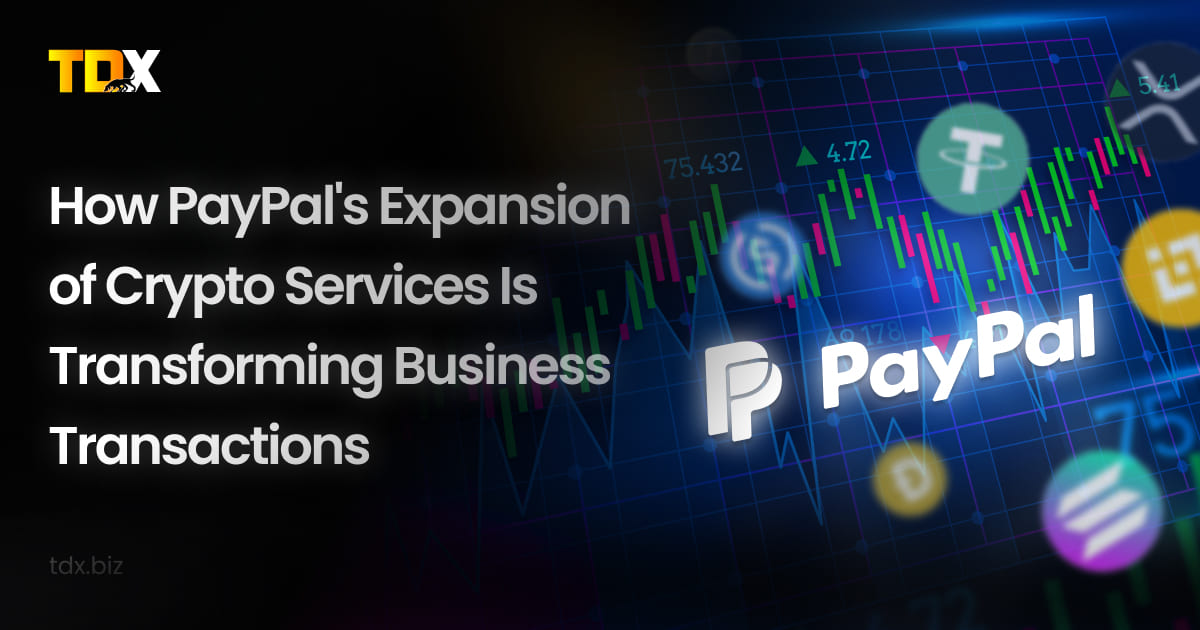




How PayPal’s Expansion of Crypto Services Is Transforming Business Transactions
PayPal has been a trailblazer in the world of digital payments, consistently offering innovative solutions for both individuals and businesses. Recently, they have taken a bold step by enabling U.S. merchants to buy, hold, and sell cryptocurrencies directly from their business accounts. This move is a big deal, as it opens up new possibilities for businesses to interact with digital currencies, potentially changing the way transactions are done.
In this article, we will look at how PayPal’s expanded crypto services could impact business transactions and create new opportunities in the digital payments sector. Read on to find out more!


Overview of PayPal’s Crypto Services Expansion
PayPal has recently expanded its cryptocurrency services to U.S. business accounts, offering them the ability to buy, hold, and sell digital currencies directly through their PayPal accounts. This new service responds to the increasing demand from business owners who want to engage with cryptocurrencies just as retail users have been able to do.
The cryptocurrencies supported include well-known options like Bitcoin and Ethereum, as well as PayPal’s own stablecoin, PayPal USD (PYUSD), which provides a USD-backed stable digital asset for transactions.
This capability is seamlessly integrated with PayPal’s existing payment solutions, allowing businesses to easily manage their crypto assets alongside traditional currencies. However, it’s important to note that this service is currently unavailable to businesses in New York State due to specific regulatory requirements and constraints.
With these expanded services, PayPal strengthens its position in digital payments, allowing businesses to explore new transactional avenues and financial strategies in the evolving world of digital currencies.
Benefits for Businesses
PayPal’s new cryptocurrency services offer significant advantages for businesses looking to streamline their operations and expand their reach. By accepting crypto, companies can enhance transaction efficiency, as crypto payments are processed quickly, often within minutes, compared to the days it can take for traditional bank transfers. This speed improves cash flow, and also enhances customer satisfaction by reducing waiting times.
Another major benefit is cost reduction. Traditional payment methods often come with high transaction fees, ranging from 2% to 4%. In contrast, crypto transactions typically have much lower fees, sometimes as low as 0.2%. These savings can significantly increase profit margins, allowing businesses to reinvest in growth opportunities.
Moreover, accepting cryptocurrency payments can help businesses tap into a broader customer base. Many tech-savvy consumers prefer using digital currencies, and by offering this payment option, companies can attract new customers who might otherwise be missed. This demographic often includes younger consumers who value innovation and are likely to become loyal customers.
Businesses that have already embraced cryptocurrency payments, like Overstock and Shopify, have seen positive results. Overstock was one of the first major retailers to accept Bitcoin, which led to a boost in sales and a new wave of customers. Shopify’s platform enables its merchants to seamlessly integrate crypto payments, allowing small and medium-sized businesses to reach a global audience.
Incorporating cryptocurrencies into payment options not only positions businesses as forward-thinking but also opens up new financial strategies, helping them stay competitive in an ever-evolving market.


Impact on Business Transactions
With PayPal’s cryptocurrency services, businesses can strategically position themselves as innovative leaders by embracing digital currencies. This move appeals particularly to tech-savvy customers who are early adopters of modern payment solutions, as highlighted in The Business Concept’s discussion on the advantages of crypto payments. These customers tend to be younger and more likely to remain loyal, and it helps businesses significantly expand their customer base.
Technically, cryptocurrencies differ from traditional payment methods by operating on decentralized blockchain networks. This decentralization allows transactions to occur directly between parties without intermediaries, resulting in faster and more secure processes. Such efficiency and transparency foster greater trust with customers, enhancing operational effectiveness.
Moreover, crypto payments offer a distinct advantage for international transactions. According to insights from B2BinPay, traditional cross-border payments often involve delays and currency conversion fees, whereas cryptocurrency transactions eliminate these barriers. Businesses can transact directly in digital currencies, bypassing exchange rate concerns, thus enhancing their global reach. This capability makes it easier to engage with international customers and expand into new markets seamlessly.
Embracing PayPal’s crypto services empowers businesses to streamline their operations while simultaneously elevating their reputation as trailblazing innovators. This combination of strategic positioning and operational excellence simplifies processes and enhances the company’s image. It makes cryptocurrency integration a compelling choice for those eager to outpace competitors and lead in the marketplace.


Potential Challenges
While PayPal’s new crypto-related services offer numerous advantages, businesses always navigate a landscape filled with different potential challenges. One of the most significant hurdles is the inherent volatility of cryptocurrencies. As you know, unlike traditional currencies, digital currencies can experience dramatic price swings in short periods. This volatility can complicate pricing strategies and financial planning, as businesses might face unexpected changes in revenue or costs.
For instance, a payment received in Bitcoin may be worth less within days, impacting profit margins and financial projections. To mitigate these risks, some companies are adopting dynamic pricing models or converting cryptocurrencies to stablecoins or fiat currencies promptly to stabilize financial outcomes.
Regulatory concerns also loom large in the crypto space. As governments worldwide grapple with the rapid evolution of digital currencies, regulatory frameworks are continually evolving. Businesses must ensure compliance with these laws to avoid legal pitfalls. It includes adhering to anti-money laundering (AML) and know-your-customer (KYC) regulations, which can vary significantly between jurisdictions.
The regulatory environment is significantly complex, and staying informed about changes is imperative for businesses seeking to integrate cryptocurrencies into their operations while ensuring legal compliance.
Security is another critical area of concern. With digital currencies, the risks of cyber theft and fraud are ever-present. PayPal has taken steps to safeguard transactions by implementing robust security protocols. It includes end-to-end encryption and two-factor authentication to ensure that users’ data and funds are protected.
Additionally, PayPal’s risk management systems are designed to detect and prevent fraudulent activities, offering businesses a level of assurance in their crypto transactions. These measures are vital for fostering trust and reliability, crucial for businesses and consumers alike in this emerging market.


Future Implications
Digital currencies definitely continue to reshape the financial world, and the role of crypto in business transactions is poised to expand significantly. PayPal, already a major player in this domain, is likely to further innovate its services to meet the growing demand for seamless and secure cryptocurrency transactions. Businesses can expect PayPal to enhance its offerings, possibly introducing more currencies and advanced tools for managing digital assets.
The shift towards digital currencies is not just a passing trend but a significant transformation in how businesses and consumers handle money. Companies need to prepare for this shift by adopting flexible strategies that accommodate both traditional and digital payment methods. It includes updating payment infrastructure, training staff on cryptocurrency handling, and staying informed about technological advancements.
Looking ahead, PayPal is anticipated to introduce initiatives aimed at making cryptocurrency more accessible and user-friendly for businesses. This might include partnerships with other financial institutions, the development of educational resources, or even enhancements in security protocols. Industry changes are expected to include increased regulatory clarity and technological innovations that support faster and more efficient transactions.
As things change, businesses that actively embrace these shifts will be in a stronger position to take advantage of cryptocurrency benefits, helping them stay competitive in today’s digital-focused economy.


Conclusion
PayPal’s expansion into cryptocurrency has the potential to significantly transform how businesses handle transactions. Integrating digital currencies allows PayPal to offer more flexibility and unlock a wider range of financial opportunities for businesses around the globe. This move emphasizes the need to stay informed and proactive as digital finance continues to evolve.
For businesses, keeping up with trends in digital currency is no longer optional but essential. As the financial ecosystem shifts, understanding these changes can give companies a competitive edge and prepare them for the future.
Now is the time for businesses to consider integrating cryptocurrency into their transaction processes. Embracing this change can lead to improved efficiency, access to new markets, and a stronger position in the digital economy. Take action now to explore how cryptocurrency can benefit your business and ensure you are ready for the future of commerce!
40,000 readers 🚀 are getting insights with our media





Article
“Is Ethereum dead?” This is a trending argument that is appearing in various crypto communities and media. Which is not…






Guide
Welcome to the beginner’s guide on Trust Wallet, MetaMask, and Exodus—three most common cryptocurrency wallets for managing your crypto assets….






Article
When Venezuela’s inflation hit 189.8% in 2023 [Central Bank of Venezuela, 2023], Maria’s life savings of 200 million bolivars (enough…






Article
For generations, Indians have trusted one investment: fixed deposits (FDs). If you walk into any Indian household, chances are someone…






